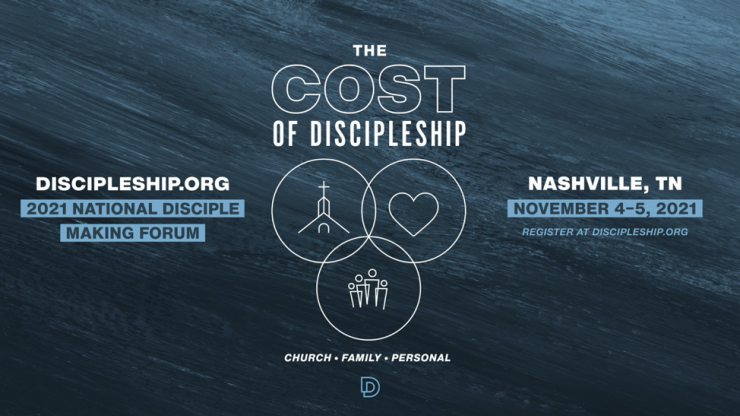How to Disciple People Online
Discipleship-First Friends,
I am just completing an experiment in disciple making with some current and future leaders in the staff at our church that I wanted to share with you.
The success we experienced in our group could be utilized to help other disciple makers with one of the biggest challenges North Americans face—because so many people are busy today!
I hear people say, “I would like to disciple others, but my schedule is just too full and unpredictable to meet regularly with people.”
Are you hearing this type of comment in your ministry or church?
Let me tell you about my journey so that you can see what I have learned about online meetings …
I planted the church in the late 1990s, where I continue to serve as Lead Pastor. We have always wanted our elders to pray weekly, but we could never find a realistic place and time where to make it work on a consistent basis. We are a disciple-making church, so each of our elders are in small groups (8-15 people) or what we call “transformation groups” (3-6 people), or both.
With weekend services, discipling groups, and the ongoing duties of elders—how could we find a weekly time for a prayer meeting? To give you a better picture of our scenario: One of our elders is a pilot who flies during the week, another is a sales manager who often travels during the week, and others have tight schedules too… you get the point.
But over two years ago everything changed …
We started to have prayer meetings every Thursday morning at 6 am … on Zoom! (This is not a product plug for Zoom, by the way; Skype or another video service can work just fine.)
The results? We now have hosted weekly prayer meetings for over two years, and it works! Here is why: There is no travel to the meeting (just getting online at home or work), there are few work or social conflicts at 6 am, and the elders can join from anywhere in the world as long as they can get online.
My positive online experience with our elders led me to start an online discipleship group (Transformation Group) with some other guys at our church. Let me just say, upfront: discipling relationships are best when they are face-to-face and life-on-life. And they should involve sacrifice … I do not want to minimize any of those things in what I am writing. But my online experience, described below, is designed to help solve a logistical challenge of meeting with others.
We utilize a model developed in partnership with Discipleship.org and Renew.org. Here are the basics of these groups (remember the meetings are conducted online):
- Fast and Pray First– the leader and an apprentice fast and pray for a period of time seeking the Spirit’s leadership on who to invite into the group – including at least one non-disciple – the group should be kept to 3 to 6 people and they are of the same gender.
- Recruit Individuals– people are invited to a group covenant meeting, after expressing interest in the group. This covenant – describing the necessary commitment to be in the group – forms the basis of the group. Again, we held this meeting online.
- Weekly Meeting on Zoom– we established a time that we thought would work for everyone each week (weekly meetings are important in discipling relationships). We picked Tuesday nights from 8:30 PM to 9:30 PM. This enabled the men with families to be at home with their families and get their children to bed before the meeting started.
- Relational Connection– The group started with a high relational exercise developed by Regi Campbell of Radical Mentoring. This is a super effective exercise where every person takes one full meeting (one hour) to tell their spiritual biography (it works even for atheists).
- Foundational Doctrines– After the spiritual biographies, we worked our way through 8 teachings on foundational doctrines – we use a workbook that is brief, easy to read, and requires each person to fill in a few blanks.
- Multiplication– after six months, the group will either multiply into two new groups or extend the current group meetings for another six months before multiplying utilizing a modified version of Discover Bible Study questions (see discoverapp.org). Multiplication is built into the group through 1) upfront recruitment of an apprentice and 2) the upfront covenant includes the commitment to multiply.
Here’s what I learned from my experiment in disciple-making:
1. First, I learned that online platforms can be a great tool for working through logistical difficulties.
But they do come with certain challenges…
2. Second, I learned that online, face-to-face meetings end up emphasizing content a little more than relationships, which is good.
But Jesus’ method of disciple making is highly relational. Zoom meetings alone do not achieve a balance that resembled Jesus’ method. That is why the title of this post is “Discipling Busy People Online (and More)” … the “and More” part is vitally important.
Our group was focused on weekly Zoom meetings, but it was also set up with an intentional framework that created a face-to-face, relational get-together every month. In our covenant, we all embraced the seven disciple-making rhythms that are found in the life of Jesus (see the free eBook by Jason Dukes, Inviting Along). The following graphic is a summary of the seven rhythms.
After we started the group with 1) “prayer and fasting,” 2) we “invited along” disciples and those yet to be disciples, 3) we committed (in the covenant) to “maturing while multiplying,” and 4) we had our “learning” content established (spiritual biographies and foundational doctrines).
That left three rhythms that we could only share by face-to-face, life-on-life time together. So in my experimental group, we made the following commitments in our upfront covenant:
- Once a month we would meet face-to-face, and
- We would rotate, in these monthly face-to-face meetings, through one of the three missing rhythms: one month we met for a meal, the next month we served the needy together, and the next month we rested/sabbathed together.
With these monthly meetings, weekly Zoom gatherings, and seeing each other at church on Sundays, our group achieved a balance that reflected the seven rhythms found in Jesus’ method of disciple making.
This all leads me to the last point …
3. Third, I learned that this kind of group can be really effective and successful.
Here is what we experienced:
Everyone was faithful to a one hour weekly meeting—everyone joined together at the weekly Zoom meeting—it was rare that anyone missed—because they could make one hour per week work (with their families, children’s bedtime, their jobs, and their schedules).
They participated even when out of town or at work or busy with family.Here are the specifics that show how everyone made the meetings every week.
- I joined a meeting while in Florida for a pastor’s gathering – I got to my hotel room by 8:30 PM that night. Another time I was in Calgary, Canada, visiting my parents, and I joined for one of our best discussions.
- One of the guys joined from Vienna, Austria – he is a world class musician with a recital in Vienna – but he joined our Zoom meeting from Vienna at 3:30 AM because he was committed to our 8:30 PM Central time meeting and he could make it work from his hotel.
- One of our guys joins periodically from the hospital – he works in anesthesia and often, without notice, he may be required to work late. Yet he finds a way to take a break or get to the end of his work, just in time for our 8:30 PM Zoom meeting. He previously had been very disappointed that he could not be in a Transformation Group – he did not know how he could join a group with his unpredictable schedule.
- Our worship leader loved the experience – I have intentionally discipled our church’s worship leader to the point where I am preparing him to multiply and lead Transformation Groups in our worship arts ministry. He shared with me how in his “crazy busy life” this model really works for him. He and his wife are already leading a small group every week, he leads our worship team, he writes music, and has some outside work that helps him make ends meet. He put it this way: “I love the group and what God is doing … I can put my children to bed, connect with my wife, and then join the one hour meeting from 8:30 PM to 9:30 PM before getting ready for bed.”
I discipled them through significant biblical content. As I mentioned above, online meetings, in my experience, tend to emphasize content a little more than face-to-face meetings. This is an important part of discipling relationships and here are some of the highlights:
- One of the members of our group is a Muslim. He was really engaged in the discussions. He started by sharing his spiritual biography – wow, did it help us to understand him. Then, when we got into our biblical content, he was fully engaged – preparing for the discussion every week and providing great insights and reflections. He has not yet become a disciple of Jesus, but he is heading in that direction.
- One of the men I am discipling described how he benefitted from the group: Meeting virtually with other Godly men has been a blessing as my work weeks are often over 60 hours and finding time to travel long distances can be a challenge.
- Here is what one of the men I am discipling said: I was surprised at how intimate you can get in an online group setting like this. I have also really enjoyed the ease of not having to give up family time at home in order to be in a Transformation Group.
- I picked these men because they will likely be future church leaders. I discipled them in core biblical doctrines so that they really grasped them and are now equipped to disciple others in these doctrines.
- I discipled them in a model that they “really liked and benefitted from” and they can easily turn around and replicate it with others, even though they are busy. We are making disciples who will make other disciples with this model.
I discipled them in relationships and service. Our once-a-month, face-to-face gatherings (in addition to seeing each other in passing at church) helped add to the group. We connected with each other over meals, we sabbathed by hanging out with our families together, and we served the needy together (shoulder to shoulder). We are texting each other almost daily and we have individual times with each other “just because we enjoy being together.”
Men and women can easily replicate this model with others. My wife has also used Zoom to meet with the women in her group when the weather was a problem or she had to be out of town. Replication is very important. Jesus’ method was a method that his disciples were able to reproduce. Our goal is not just to “make disciples” but also to “make disciple makers.” And this model is simple, effective and reproducible—just what disciple makers need.
I am sharing my experience with you because I believe that many of you will find it helpful. I hope you can improve upon it (let me know any enhancements that you learn). Here is the bigger point: We have to find ways like this model to help disciple makers with the big challenge we face in North America—everyone is so busy.
I want to say, again, that face-to-face, life-on-life is the best way to disciple people. But I also think online meetings may be the only way that some potential disciple makers can lead others – or at least, it can be a supplement that makes the meetings more regular.
People all around us need to be discipled. So let’s find more and more effective ways to offer them discipling relationships.
For King Jesus,

Bobby Harrington, Lead Servant, Discipleship.org
P.S. Check out our two National Disciple Making Forums.
- April 29–May 1, 2020 in Phoenix, Arizona. Sign up here
- October 15–16, 2020 in Nashville, Tennessee. Sign up here.





